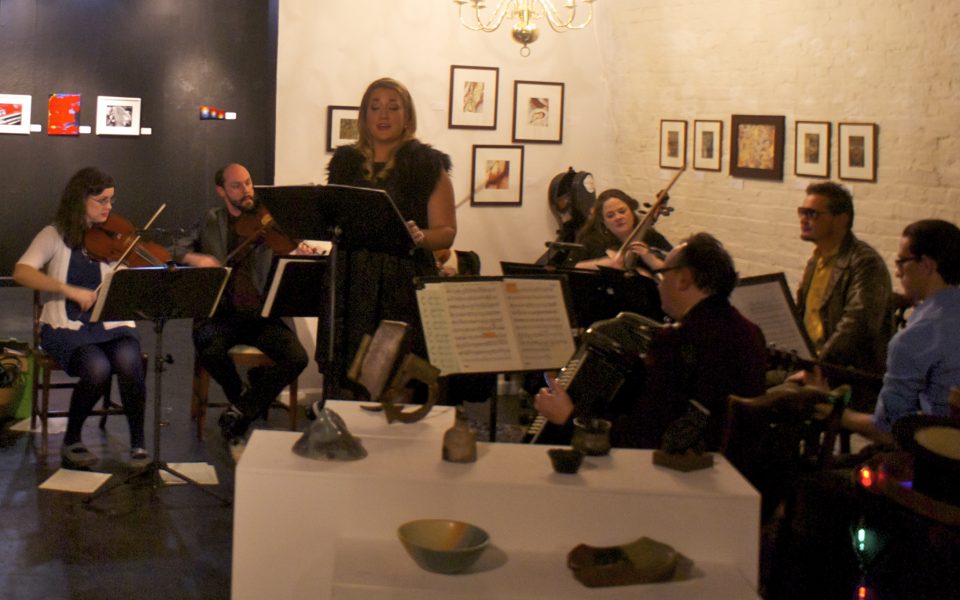by Anthony Harrison
Fur Salon Orchestra’s tagline is, “Definitely unexpected.”
The unexpected happened again and again when I went to see them at Delurk Gallery in Winston-Salem on Jan. 2.
For one, when it seemed all the musicians were accounted for and ready to perform, Bü P. Scherf, Fur Salon Orchestra’s accordion player, arranger and bandleader, blustered in at about 10:45 p.m. — in a way, definitely unexpected.
After Scherf unpacked his squeeze and sheet music, the band tuned up and they played their first piece.
The group, in Scherf’s understated words, plays “campy festival arrangements of popular mid-tempo, mid-century favorites.” The band’s line-up revolves, but maintains an idiosyncratic, all-acoustic ensemble. This night, they featured the aforementioned accordion, an operatic mezzo-soprano, a guitar, a cello, a euphonium — the tuba’s little brother — and three violas, arguably the classical string instrument with the best tone.
A triple-viola attack: Definitely unexpected. In small ensembles, the viola typically stands alone.
After the introductory instrumental, mezzo Kristin Schwecke joined the band for the Bacharach-David classic, “(They Long to Be) Close to You.”
The audience, who had previously milled about drinking complimentary Sangiovese and checking out Art-o-Mats and other exhibit pieces, suddenly focused the band. Even the birds in the paintings on the walls and rucked in corners seemed to listen with rapt attention.
Scherf’s unique arrangement of the hallowed tune set the tone for the rest of the night.
Schwecke combined Karen Carpenter’s alto with crystalline, classical timbre. The guitar strummed lightly, yet percussively, in lieu of drums. The cello commanded the dual role of bass and tonal colorist. Brent Harvey’s rusted euphonium sang silky-smooth solo lines. And the viola trio, instead of bunching together in a muddled mess, both doubled the vocal and provided the velvety harmonic backdrop.
Despite seeming hodgepodge, Fur Salon Orchestra’s simultaneous richness and clarity blew the crowd away.
Their origin story comes as unexpected as their textural brilliance.
Scherf, a graduate of UNC School of the Arts, always delighted in arranging music — “making things fit,” as he put it. After UNCSA, he arranged music for the Main Squeeze Orchestra, an all-female accordion group out of New York City.
“I arranged Russian music, Queen, you name it,” Scherf said.
He held the gig for 10 years. Then a friend asked Scherf if he would perform at her wedding.
“I didn’t want to ruin her wedding,” Scherf laughed, “but I came up with all these dreary, campy arrangements.”
The wedding band morphed into Fur Salon Orchestra.
This line-up matched local talent with out-of-towners: Cellist Alex Johnston went to high school with Scherf; guitarist Stuart McLemore came from Fayetteville; violist Kara Poorbaugh drove over from Asheville, where she plays in the Opal String Quartet.
Perhaps most impressively, Schwecke flew in from Milwaukee the day of the performance.
While there were many shining moments, maybe the best was the Leiber-Stoller tune, “Is That All There Is,” made famous by Peggy Lee. While certain essential elements remained – the spoken narration and its dark humor, especially – Scherf’s vision gave the song a different life. Where Lee’s narration was deadpan, Schwecke was flippant and defiant. And the tempo was slower, the feel much looser, the group playing like a drunken New Orleans funeral band.
It may seem crazy, but Fur Salon Orchestra may have beaten the masters at their own game.
After the show, Scherf explained, “I’d worked on the arrangements all day, so they were sight reading.”
Wait, what? The stellar renditions of “Close to You,” “What the World Needs Now,” “Is That All There Is,” “God Only Knows” – even the regal encore of “Superstar” – had basically been a rehearsal?
Definitely unexpected.
In retrospect, it isn’t surprising. This iteration of Fur Salon Orchestra united a group of tremendously talented, classically-trained professional musicians.
Even in the world of rigorous, grueling practice, it’s often imperative to expect the unexpected.
In Fur Salon Orchestra’s case, the unexpected is definite — and definitive.
Join the First Amendment Society, a membership that goes directly to funding TCB‘s newsroom.
We believe that reporting can save the world.
The TCB First Amendment Society recognizes the vital role of a free, unfettered press with a bundling of local experiences designed to build community, and unique engagements with our newsroom that will help you understand, and shape, local journalism’s critical role in uplifting the people in our cities.
All revenue goes directly into the newsroom as reporters’ salaries and freelance commissions.


Minor correction: Kristin is a soprano (not mezzo)!